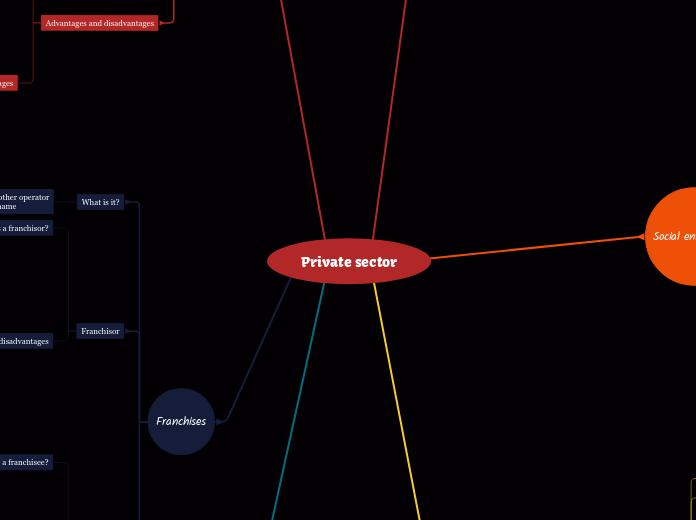Private sector
Multinationals
Key features
Highly influential both economically and
politically
Highly advanced and up to date technology
Powerful advertising and marketing capability
Highly qualified and experienced
professional executives and managers
Huge assets
A large business with significant
production or service operations in
atleast 2 different countries
Franchises
Franchisee
Expensive way to start a business
Lack of independence
Strict contracts have to be signed
Profit is shared with the franchisor
National marketing may be
organised
Setup costs are predictable
Backup surport is given
Less risk
Who is a franchisee?
Operator who trades under
their name
Franchisor
Cost of support for franchisees may
be high
Franshisees may get merchandise
from elsewhere
Poor franchisees may damage
brand's reputation
Profit is shared with the franchisee
Franchisees are more motivated
that employees
Franchisees take some of the risk
Cheaper method of growth
Fast method of growth
Who is a franchisor?
Owner of business
A business allows another operator
to trade under their name
Partnerships
Partnersips still tend to be small
Any partner's decision is legally
binding on all
Partners may disagree
and fall out
Profit has to be shared
Have unlimited liability
Finanacial info is not published
Job of running the business
is shared
Partners can specialise in their
area of expertise
Easy setup
It is a legal document that states the
partner's rights
However, they can draw up a deed of
partnership
There are no leagal fomalities to
complete when forming a partnership
They also share the profits
Owners will share responsibilities
for running the business
A business owned by 2-20 people
Limited companies
Public limited
Advantages and disadvantes
Managers may take control rather
than owners
More regulatory control owing to
company acts
May be more remote from customers
More financial info has to be published
Outsiders can take control by buying shares
Setting up can be very expensive
May have high profile in the media
Shares can be bought and sold very easily
May be able to dominate the market
PLCs can exploit economies of scale
Large amounts of capital can be raised
Any person or organisation can buy shares
in a PLC
Their shares can be bought and sold by the
public on the stock exchange
Larger that private limited companies
Private limited
Advantages and disadvantages
Cannot raise huge amounts of money
Takes time to transfer shares to new owner
Profits are shared between more members
Costs money and time to setup
Financial information has to be published
Has more status
Business continues if a shareholder
dies
Control cannot be lost to outsiders
More capital can be raised
Shareholders have limited liability
What is it
However, a small minority are large
Business that tend to be small or
medium sized
Main features
To form a limited company, it is necessary
to follow a legal procedure
Whereas soletraders and partnerships pay
income taxes, companies pay corporation
tax on profits
The shareholders elect directors to run the
company
The business raises capital by selling shares
Owners have limited liability
Social enterprises
Varieties of forms
Charities
Some run business ventures such as charity
shops
They may also organise fundraising events
such as cake sales, sponsored actvities and
selling greeting cards.
They rely on donations for their revenue
They exist to raise money for good causes
draw attention to the needs of
disadvantaged groups
Worker cooperatives
Workers will contribute to production and be
involved in decision making, share in the profit
and provide some capital when buying a share
in the business
They are businesses in which its employees
share ownership
Cooperatives
Any profit made by the cooperatives is
given to members
They buy shares which entitle them to
elect directors to make key decisions
They are owned and controlled by
their members
Usually operate as consumer
cooperatives or reatail cooperatives
Reinvest most of their profits
Generate most of their income
through trade or donations
Have a clear social and/or
envoronmental mission
A business that aims to improve
human or environmental well-being.
Sole traders
Advatages and disadvantages
Disadvantages
No continuity
Long hours and hard work
Independence maybe too much
of a responsibilities
May struggle to raise finance
Owner has unlimited liability
Advantages
May qualify for government
help
Can offer personal
service because they
are small
Flexibility
Simple setup
Independent
Owner keeps all the profit
What is it?
Owner has umlimited liabibility
No legal requirements for setup
It is the simplest form of business
A business owned by a single person









